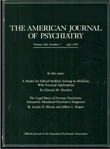Last month I had the opportunity to round with second-year residents on a general psychiatry inpatient unit at a Department of Veterans Affairs (VA) medical center. The first patient we saw had been admitted following a suicide attempt. He had a history of polysubstance abuse, had been discharged from the military in the 1960s for what was called a “neurotic reaction,” had been admitted to VA facilities more than 15 times over the 20 years since discharge, and was currently being treated for a panic disorder unresponsive to benzodiazapines and selective serotonin reuptake inhibitors. The next patient was also a veteran with service-connected illness who carried a diagnosis of schizoaffective disorder. Despite aggressive outpatient treatment with benzodiazepines, anti~psychotics, mood stabilizers, and two different antidepressant medications, his dysphoria, suicidal ideation, and command hallucinations had recently worsened, leading to the current admission. The third patient was admitted because of a severe depression. He had been noncompliant with medications and acutely suicidal after losing his job and being thrown out of his house by his wife. He carried a diagnosis of narcissistic personality disorder with borderline features (diagnosed by the nurses), bipolar disorder (diagnosed by the admitting resident and on several previous admissions), and posttraumatic stress disorder (diagnosed by his outpatient treatment team). The other cases were similar; they were marked by multiple diagnoses over time, noncompliance with prescribed medications, overuse of nonprescribed drugs, staggering amounts of polypharmacy, and nonresponse to both traditional and nontraditional treatment approaches. Increasingly, such difficult cases define psychiatric practice today. Consequently, Challenges in Clinical Practice, a guide to the diagnosis, epidemiology, risks, and management of treatment-refractory psychiatric disorders, is a timely addition to the psychiatric literature.
The volume is unique in many ways. First, although multiauthored, it is tightly written. Each chapter is arranged around a general discussion, statement of the problem, risk factors, standard approaches, and more novel approaches when the first treatment attempt or two do not work. This internal consistency is maintained, at least in part, by the major role each of the editors has in co-authoring several chapters and by the fact that they selected present or past faculty of the Massachusetts General Hospital Department of Psychiatry as contributors. Second, although many reviews have discussed treatment-refractory depression, far fewer have grappled with refractory bipolar disorder, psychotic disorder, or anxiety disorder. In one volume, this book covers most of the major psychiatric disorders seen in modern practice. Third, unlike most reviews of treatment-refractory disorders, which emphasize biological treatments to the exclusion of other approaches, this volume gives almost equal weight to the role of cognitive behavior therapies. Indeed, several disorders (e.g., major depression, panic disorders, eating disorders) are dealt with in two equally scholarly chapters, one on pharmacological approaches and another on cognitive behavior approaches. There are also excellent discussions of when and how to select one or both modalities for patients whose initial treatment has less than optimal results.
The editors have put together a terrific text that is useful for the experienced clinician as well as the novice and for psychiatrists as well as nonmedical professionals responsible for the care of patients with psychiatric disorders. Each chapter is strong and can stand by itself as an up-to-date summary of available information with practical suggestions for clinical care. Perhaps the editors will consider taking up a few more of the challenges many of us face in our practice for their next edition. For one, it might be useful to hear more about other psychotherapeutic approaches to treatment, such as interpersonal psychotherapy for major depression, and how and when other approaches might best be employed. The next edition might also provide approaches to treating elderly patients with behavioral and/or cognitive difficulties, and advice on what to do when the first treatment attempt fails (as it so often does). Finally, it would be helpful if the next edition discussed the potential adverse effects of cognitive behavior and other psychological treatments in as much detail as it does for treatment-emergent effects of pharmacological treatments.
Until the next, improved edition, the present volume is easily the best, most authoritative, integrative, and comprehensive text of its kind. Anyone facing the kind of clinical challenges this book describes—patients who do not respond to our initial treatment strategies—would do well to read and reread this invaluable guide.

